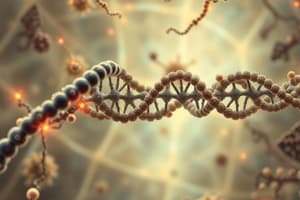Podcast
Questions and Answers
Match the following terms related to DNA replication with their descriptions:
Match the following terms related to DNA replication with their descriptions:
Helicase = Unwinds the double-stranded DNA DNA polymerase = Adds new nucleotides to the growing DNA strand Ligase = Joins Okazaki fragments on the lagging strand Primase = Synthesizes RNA primers to initiate DNA replication
Match the following terms related to gene expression with their descriptions:
Match the following terms related to gene expression with their descriptions:
Transcription = Process of creating an RNA copy of a DNA sequence Translation = Process of synthesizing a protein from an RNA sequence RNA polymerase = Enzyme responsible for creating an RNA strand from a DNA template Ribosome = Cellular machinery where translation occurs
Match the following terms related to epigenetics with their descriptions:
Match the following terms related to epigenetics with their descriptions:
Methylation = Attachment of a methyl group to DNA, often associated with gene silencing Histone modification = Chemical alterations to histone proteins that can influence gene expression Environmental factors = External influences that can impact gene expression without altering the DNA sequence Epigenetic inheritance = Transmission of epigenetic changes from one generation to the next
Match the following amino acid codons with their corresponding amino acids:
Match the following amino acid codons with their corresponding amino acids:
Match the following terms related to DNA replication with their descriptions:
Match the following terms related to DNA replication with their descriptions:
Match the following terms related to gene expression with their descriptions:
Match the following terms related to gene expression with their descriptions:
Match the following terms related to epigenetics with their descriptions:
Match the following terms related to epigenetics with their descriptions:
Match the following terms related to protein synthesis with their descriptions:
Match the following terms related to protein synthesis with their descriptions:
Flashcards are hidden until you start studying
Study Notes
DNA Replication
- DNA replication is the process by which a cell makes an exact copy of its DNA before cell division
- It involves the unwinding of the double helix, the separation of the two strands, and the synthesis of a new complementary strand for each original strand
Gene Expression
- Gene expression is the process by which the information encoded in a gene's DNA is translated into a functional product, such as a protein
- It involves the transcription of DNA into RNA, and the translation of RNA into protein
Epigenetics
- Epigenetics is the study of heritable changes in gene function that occur without a change in the underlying DNA sequence
- It involves the addition of chemical groups to DNA or histone proteins, affecting gene expression without altering the DNA code
Amino Acid Codons
- Amino acid codons are sequences of three nucleotides in mRNA that code for specific amino acids during protein synthesis
- There are 64 possible codons, which code for 20 amino acids and three stop signals
Protein Synthesis
- Protein synthesis is the process by which cells create proteins, which are essential for nearly all cellular functions
- It involves the translation of mRNA into a polypeptide chain, which is then modified and transported to its final destination in the cell
Studying That Suits You
Use AI to generate personalized quizzes and flashcards to suit your learning preferences.




